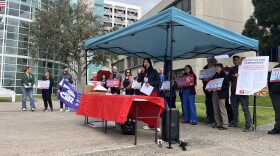China is sputtering into an economic slowdown, just as the world is counting on it to be a leading engine of growth. The export sector — which has driven 30 years of double-digit growth rates — is struggling badly.
In Dongguan, a major manufacturing hub in the south of the country, a talking plastic Halloween gargoyle has pride of place in Mr. Su's office. Su's factory has made such gadgets for the past 15 years, contributing in its own small way to China's economic miracle. But now that miracle seems to be going sour.
"There's almost no profit," Su complains. "Raw materials have gone up, the cost of labor has gone up, inflation — everything's gone up except for the cost of the product."
His factory floor is uncharacteristically quiet. Normally, 100 workers would be toiling; now, he is keeping on only 20. Wages have gone up by around 20 percent in the past year because of a new labor law protecting Chinese workers; raw materials are about 30 percent more expensive; and the Chinese currency has strengthened by about 9 percent over the year, meaning Chinese goods are getting more expensive.
For Su, who exports almost all his toys to the United States, the financial turmoil is the last straw. He complains that American importers are delaying payments to Chinese suppliers, sometimes by as long as 120 days, passing liquidity problems down the chain.
"It's an economic tsunami," Su says. "America's problems are washing over Asia and the whole world. It's like an economic world war. It's an economic catastrophe."
So far, he is one of the luckier ones. Xinhua news agency says nearly 80 percent of toy factories in Guangdong province have closed, along with almost half the shoe factories. According to one state-run newspaper, 37 percent of Dongguan businesses are losing money.
"We've probably lost 40 to 45 percent of our turnover in the last four months," says Australian expatriate Chris Crossing, who owns a lighting factory in Dongguan. "We have — for the first time in 10 years — no orders on our books for November and December."
Crossing says he believes the worst is yet to come. "The corporations that carry major warehouses in the USA and in Europe are finding their inventory levels not going down. They're finding excessive stock in warehouses, which means [they] can't order new products to replenish what should have sold," he says.
Crossing says smaller businesses producing low-end, low-profit, low-tech goods are hurting badly, and the rash of bankruptcies will affect American consumers.
"I believe the basic necessities that we all take for granted — the plastic clothes baskets, the plastic pegs, the toothpicks that we all buy in our local supermarkets — they're going to be hard to find in the future because they're just not being produced in China, because companies just aren't there any longer," he says.
Exports account for around one-third of China's economic growth, so many economists are revising their China growth estimates down to single digits for almost the first time in 30 years. Austin Dolezal, who works for Skechers shoes in China, says price tags for made-in-China goods will go up.
"In the end, the consumer has to start paying a bit more. They can't go on forever getting low prices, and lower and lower prices," Dolezal says. "That cycle is coming toward an end."
Things are so bad in factories that the local authorities have put together their own bailout package of $150 million for struggling businesses. But much of the problem is actually created by the central government in Beijing, rather than by the economic turmoil.
Harley Seyedin, the president of the American Chamber of Commerce in South China, says this slowdown was the result of deliberate action by the government.
"The majority of this happened because of changes in regulations last year deliberately decided by the Chinese government in order to slow down the economy and to move away from reprocessing [and those] labor intensive, environmentally unfriendly and energy-intensive kind of companies," Seyedin says. "And certainly some companies have suffered as a result of that. Those types of companies needed to go anyway."
But with unemployed workers crowding the local labor exchange, some economists fear the government was too aggressive in forcing change. State-run newspapers say 20 million Chinese workers have lost their jobs in the first half of this year. China's Communist Party has based its legitimacy on the promise of economic prosperity and rising living standards. It has kept those promises for three decades, but the perfect storm created by its own reforms and the financial turmoil overseas could mean trouble ahead.
Copyright 2022 NPR. To see more, visit https://www.npr.org. 9(MDAzMjM2NDYzMDEyMzc1Njk5NjAxNzY3OQ001))







